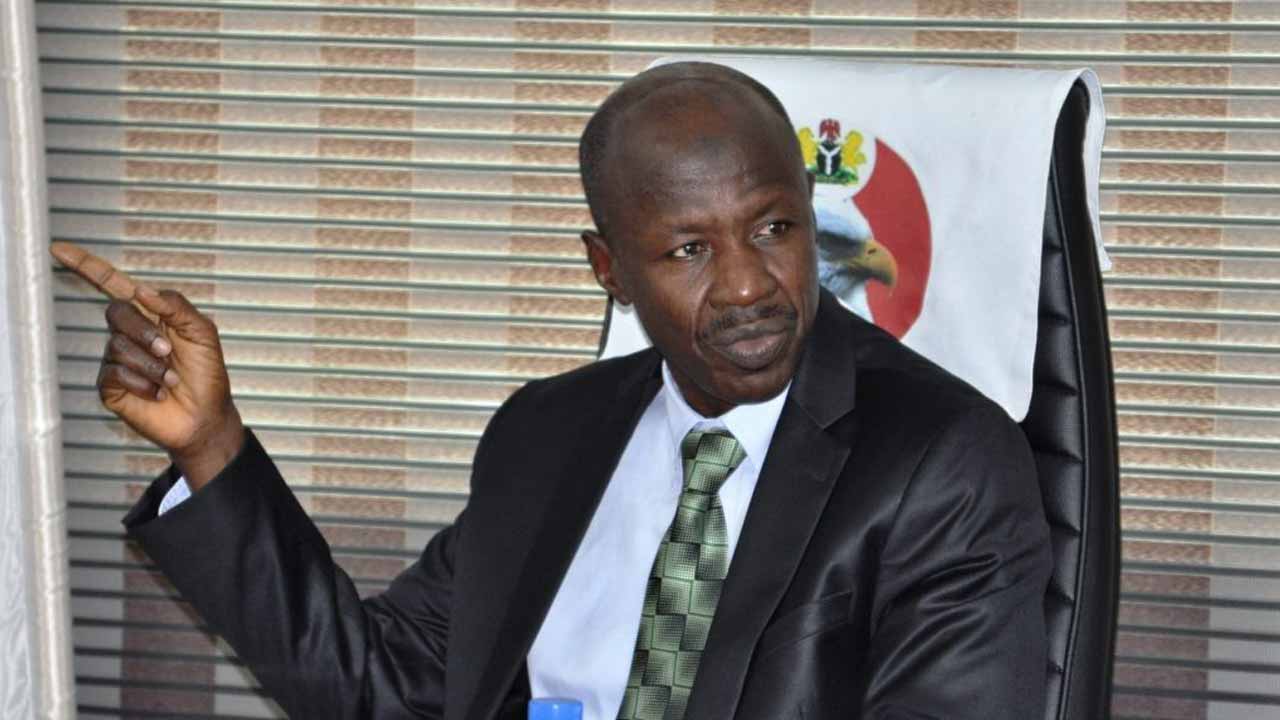- Magu: EFCC Has Recovered over N430bn Loot in Eight Months
The Economic and Financial Crimes Commission (EFCC) wednesday said it had recovered about N409 billion and $69.5 million (totalling N430 billion), among other foreign currencies, as proceeds of corruption between January 1 and August 30, 2017.
The acting Chairman of the EFCC, Ibrahim Magu, made the disclosure at a parley with journalists in Abuja yesterday, where he provided further insight into the anti-graft war.
He also decried the tactics employed by some politically exposed persons facing corruption charges to obstruct the EFCC in carrying out its duties, resorting to his usual refrain, “corruption is fighting back.”
Magu said: “Over a month ago, the commission recovered over N329 billion from a group of oil marketers for the Nigerian National Petroleum Corporation (NNPC).
These are major recoveries from a sector of the economy.
“But to give a holistic picture of the aggressive drive to recover stolen wealth, I have the pleasure to report that the commission, between January and August 30, 2017, recorded the following monetary recoveries: N409,270,706,686.75; US$69, 501,156.67; £231,118.69; €610,816.20; Dirham 443,400.00 and SR (Saudi Riyal) 70, 500.00.”
On the former Minister of Petroleum Resources, Mrs. Diezani Alison-Madueke, Magu recalled that the commission, a few days ago, got a court order to forfeit to the Nigerian Government the sum of N7.6 billion, which was hidden in a Nigerian bank by the minister.
“Two weeks earlier, another court issued a temporary forfeiture order to seize properties worth $21,392,224 belonging to the same former minister. Those properties are awaiting final forfeiture,” he added.
Magu further debunked claims by Alison-Madueke that the EFCC had failed to link the recovered illicit funds and properties to her.
“All these properties are all available; it’s real, it’s not like they don’t exist. They exist, it’s not media hype. We have been able to establish that there is thorough linkage between that and the proceeds of corruption, stealing and looting,” he added.
The EFCC chairman also reiterated the stance of the federal government to disclose Nigerians who have siphoned public funds to the United Arab Emirates (UAE).
He explained that with the new treaty signed with the government of the UAE, EFCC officials will soon head to Dubai where it will unveil looters with traceable corrupt dealings in the country.
“We have been to Dubai with the Attorney General of the Federation, and I had a meeting with a delegation from UAE, we were waiting for the ratification.
“They have a better database, they are operating the beneficiary ownership method. They would also open their doors and would disclose everybody, it is going to work for us, we are going there as soon as possible,” he said.
On the purported rift between the EFCC and the AGF and Minister of Justice, Abubakar Malami (SAN), Magu maintained that there was no rift between them.
He said: “I don’t see it. I’m naturally somebody who believes in self discipline. The AGF is the number one law officer of the country and there is no reason why there should be conflict.
“That is why we have the synergy to fight the common enemy. It’s just paper work.”
Continuing, Magu also gave reasons why the Senate is vehemently opposed to the National Financial Intelligence Unit (NFIU) operating under the purview of the commission.
He argued that most of commission’s operations revolve around NFIU, and that once the unit is separated, it would render the EFCC redundant, alleging that owing to the wide scope and efficiency of the NFIU, there is an attempt by some “high politically exposed persons with corruption charges against them to use the back door to weaken the EFCC.”
The clamour for the autonomy of the NFIU is geared towards fulfilling that hidden agenda, he submitted.
On the prosecution of corruption cases, Magu said: “We are also making progress despite the antics of some persons accused of grand corruption to delay their trial.
“Between January and August this year, EFCC recorded 137 convictions. The potential for improvement are good as more cases will be brought to conclusion in the remaining four months of the year.
“Regardless of the challenges that we have faced and continue to face, I am happy to report that we are making progress. Many of you are aware of the achievements that we have recorded in the fight against corruption especially in the area of assets recovery,” he said.


 Forex3 weeks ago
Forex3 weeks ago


 Naira2 weeks ago
Naira2 weeks ago
 Billionaire Watch2 weeks ago
Billionaire Watch2 weeks ago




 Naira2 weeks ago
Naira2 weeks ago




 Naira2 weeks ago
Naira2 weeks ago




 Naira1 week ago
Naira1 week ago




 Naira4 weeks ago
Naira4 weeks ago




 Naira3 weeks ago
Naira3 weeks ago





















